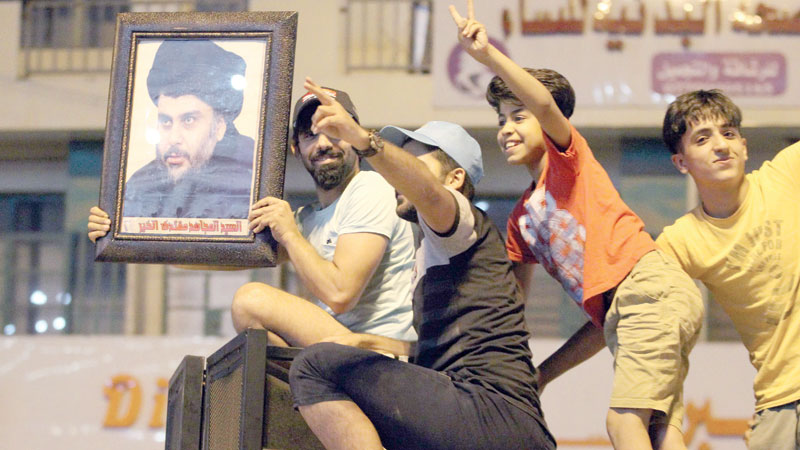

BAGHDAD: Moqtada al Sadr, a long-time adversary of the United States, led in Iraq’s parliamentary election with more than half the votes counted on Monday, the electoral commission said, in a surprise turn of fortune for the leader.
In the first election since IS was defeated in the country, militia chief Hadi al Amiri’s bloc was in second place, while Prime Minister Haider al Abadi, once seen as the front-runner, trailed in third position.
The preliminary results were based on a count of more than 95 per cent of the votes cast in 10 of Iraq’s 18 provinces.
Unlike Abadi, a rare ally of both the United States and Iran, Sadr is an opponent of both of the countries which have wielded influence in Iraq since a US-led invasion removed Saddam Hussein.
Sadr has led two uprisings against US forces in Iraq and is one of the few leaders to distance himself from foreign powers.
Potraying himself as an Iraqi nationalist, Sadr has a zealous following among the young, poor and dispossessed, but he had been sidelined by influential figures.
He can not become prime minister as he did not run in the election, though his apparent victory puts him in a position to pick someone for the job.
But even then his bloc might not necessarily form the next government since whoever wins the most seats must negotiate a coalition government in order to have a majority in parliament.
The governmment should be formed within 90 days of the official results.
The election held on Saturday is the first since the defeat of IS, with the capture of its de facto capital Mosul, last year. The group overran a third of Iraq in 2014.
Turnout was 44.52 per cent with 92 per cent of votes counted, the Independent High Electoral Commission said — that was significantly lower than in previous elections.
Full results are due to be officially announced later.
Sadr and Amiri both came in first in four of the 10 provinces where votes were counted, but the cleric’s bloc won significantly more votes in the capital, Baghdad, which has the highest number of seats.
A document provided to Reuters by a candidate in Baghdad that was also circulating among journalists and analysts showed results from all 18 provinces.
Reuters could not independently verify the document’s authenticity but the results in it showed Sadr had won the nationwide popular vote with more than 1.3 million votes and gained 54 of parliament’s 329 seats.
He was followed by Amiri with more than 1.2 million votes, translating into 47 seats, and Abadi with more than 1 million votes and 42 seats, according to calculations made by Reuters based on the document.
Ex-prime miniser Nuri al Maliki came fourth with 25 seats.
Winning the largest number of seats does not automatically guarantee that Sadr will be able to hand-pick a prime minister. The other winning blocs would have to agree on the nomination.
In a 2010 election, vice-president Ayad Allawi’s group won the largest number of seats, albeit with a narrow margin, but he was blocked from becoming prime minister.
And a similar fate could befall Sadr.
Iraqi Communist Party Secretary-General Raed Fahmy said the vote in favour of the Sadrist list, backed by his group, “is a clear message that we must have balanced relations with all (foreign countries) based non-interference in Iraq’s internal affairs.’’
“Everybody is welcome to provide support to Iraq, but not at the expense of its sovereignty and independence,’’ he added.
During the campaign, frustrated Iraqis of all shades complained about their political elite’s systematic patronage, bad governance and corruption, saying they didn’t receive any benefits of their country’s oil wealth.
“The importance of this vote is that it is a clear message that the people wants to change the system of governance which has produced corruption and weakened state institutions,’’ said Fahmy. “It is a message to provide services to the people, health and education, and to reduce social disparities.’’
Celebrations erupted on the streets of Baghdad after the commission’s announcement, with thousands of Sadr’s supporters singing, chanting, dancing and setting off fireworks while carrying his picture and waving Iraqi flags.
— Reuters
Oman Observer is now on the WhatsApp channel. Click here



